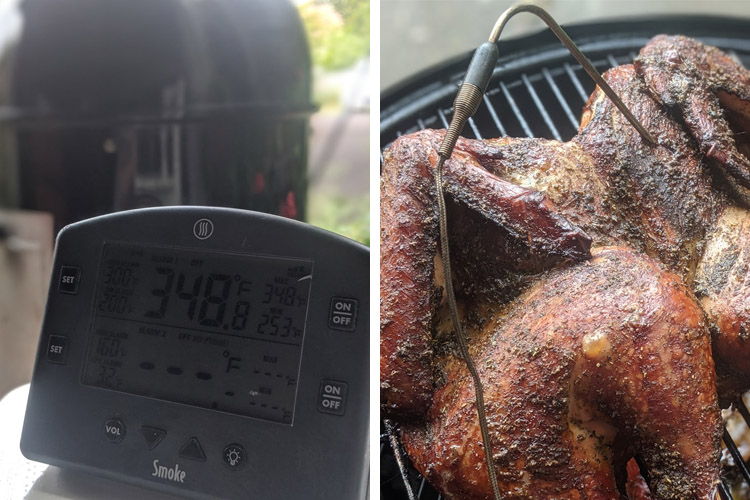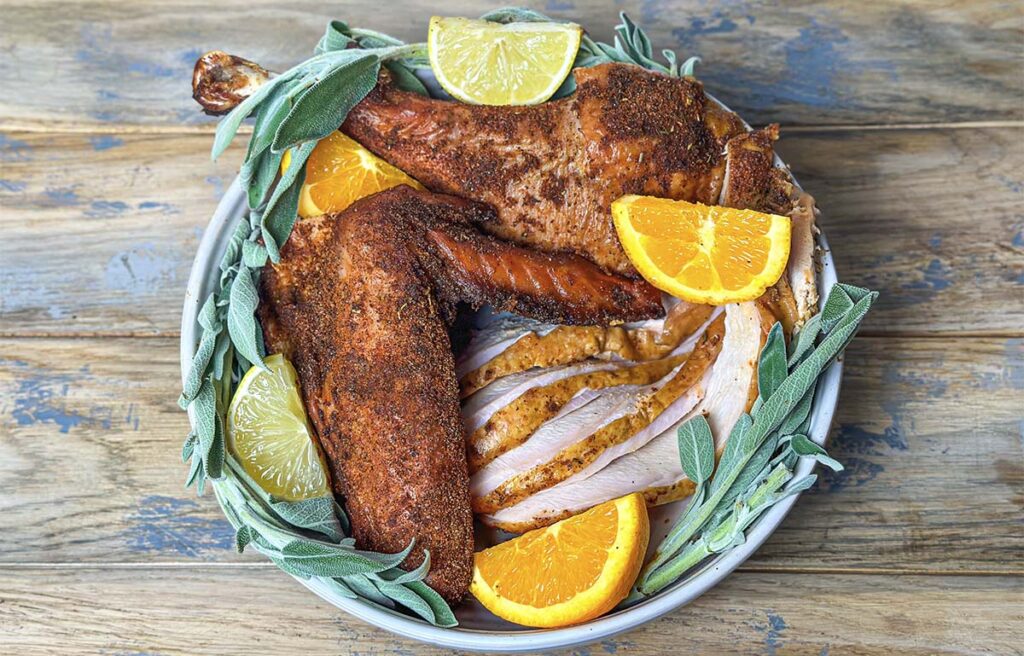Smoking turkeys or other large birds is a great way to cook them without drying them out and to add some serious flavor to the meat.
Naturally, the type of turkey you intend to use is the first decision you must make when smoking one. The type of wood you’ll be using and the flavor you want it to impart, however, are very close behind.
Personally, we like the rich color and sweet-smoky flavor of cherry wood with a hint of hickory.
But, the type of wood you use will depend on your preferences, so rather than dictating a single best option, we’ll present you with all of your options.
Smoking a turkey is a fantastic way to infuse it with incredible flavor and keep it moist and juicy. But choosing the right wood for smoking can be tricky. While there are many options, cherry wood stands out as a popular choice for its unique flavor profile and versatility.
Why Cherry Wood is Perfect for Smoking Turkey
Cherry wood offers a sweet and slightly fruity flavor that complements the delicate taste of turkey without overpowering it. It also burns clean and produces a beautiful reddish-brown color on the finished product.
Here’s why cherry wood is a great choice for your next smoked turkey:
- Sweet and mild flavor: Cherry wood adds a subtle sweetness and a hint of smokiness that enhances the natural flavor of the turkey.
- Beautiful color: The smoke from cherry wood imparts a gorgeous reddish-brown color to the turkey, making it visually appealing.
- Versatility: Cherry wood can be used alone or combined with other woods like hickory or oak for a more complex flavor profile.
- Burns clean: Cherry wood burns cleanly and produces minimal ash, making it a good choice for smoking.
How to Use Cherry Wood for Smoking Turkey
Using cherry wood for smoking your turkey is simple Here’s what you need to do:
- Choose the right wood: Look for cherry wood chips or chunks that are specifically designed for smoking. Avoid using wood that has been treated with chemicals.
- Soak the wood (optional): Soaking the wood chips in water for 30 minutes before using them can help them produce more smoke and prevent them from burning too quickly.
- Add the wood to your smoker: Follow the instructions for your specific smoker to add the wood chips or chunks.
- Smoke the turkey: Smoke the turkey according to your desired recipe and temperature. Cherry wood typically pairs well with a low and slow smoking method.
Tips for Smoking Turkey with Cherry Wood
Here are some additional tips for smoking turkey with cherry wood:
- Combine cherry wood with other woods: For a more complex flavor profile, try combining cherry wood with hickory, oak, or apple wood.
- Use a digital thermometer: A digital thermometer will help you monitor the internal temperature of the turkey and ensure it reaches a safe 165°F.
- Baste the turkey: Basting the turkey with butter or a flavorful sauce during the smoking process will help keep it moist and add additional flavor.
- Rest the turkey: After smoking, let the turkey rest for at least 15 minutes before carving. This allows the juices to redistribute, resulting in a more tender and flavorful bird.
Frequently Asked Questions
Q: Is cherry wood good for smoking turkey?
A: Absolutely! Cherry wood is an excellent choice for smoking turkey due to its sweet and mild flavor, clean burning properties, and the beautiful color it imparts to the finished product.
Q: Can I use other woods with cherry wood?
A: Yes, you can combine cherry wood with other woods like hickory, oak, or apple wood to create a more complex flavor profile. Experiment with different combinations to find your favorite.
Q: How long should I smoke a turkey with cherry wood?
A: The smoking time will vary depending on the size of the turkey and the desired level of doneness. Generally, it takes about 30 minutes per pound to smoke a turkey.
Q: What temperature should I smoke a turkey at?
A: The ideal smoking temperature for turkey is between 225°F and 250°F.
Q: Where can I buy cherry wood for smoking?
A: Cherry wood for smoking is available at most barbecue supply stores, online retailers, and some grocery stores.
Cherry wood is a fantastic choice for smoking turkey. Its sweet and smoky flavor, clean burning properties, and beautiful color make it a popular choice among barbecue enthusiasts. By following the tips and advice provided, you can easily smoke a delicious and flavorful turkey that will impress your family and friends.
Use a digital thermometer
We say this in pretty much all of our cooking tips but always use a good digital thermometer.

Compared to using a conventional thermometer, you’ll get a far faster and more accurate reading on the temperature of your turkey, which will make maintaining the proper temperature much simpler.
What are the best types of wood for smoking turkey?
As we’ve mentioned, different woods produce different flavor profiles that work nicely with turkey. Some of the most common choices include:
One of the most popular woods for smoking meat, pecans give your turkey meat a wonderful balance of sweetness, smokiness, and sharpness.
Pecan is a little more robust than many of the fruitwoods we’ll talk about later, but it still has a delicious depth of flavor and subtle nuttiness.
We advise against adding hickory to it the first time you smoke it due to its deep flavor, although you may do so with apple or cherry. The combination of two strongly flavored woods can add an unpleasant sour harshness to the turkey meat.
However, you can always add a small amount of mesquite or hickory shavings to increase the volume if you want a stronger smokey flavor after your first smoke.
Your smoked turkey will taste more earthy and spicy with the addition of maplewood, without overpowering the meat’s flavor.
Smoking over maple can help you bring out the flavors of any strong herbal flavors in a rub that you’re already using.
The meat is also given a beautiful golden color and a sweetness that is almost honey-like by the maple’s sweeter smoke.
Cherry makes a delicious smoking wood, and it can be further enhanced with rubs, marinades, or small amounts of other wood.
Our pellet grill turkey recipe uses cherry pellets as they impart a crowd-pleasing mild flavor.

As we’ve already indicated, we enjoy combining cherrywood and hickory to give the turkey meat a deeper, more complex smoky flavor.
Using cherrywood also gives your turkey a beautiful red-brown color when it comes out of the smoker, which is another fantastic advantage.
Apple is one of the more subtle woods on this list. Applewood, which has been smoking for a long time, gives the turkey a delicately sweet flavor that complements the earthiness of the meat.
But, the flavor can be extremely subtle, so you’ll need to smoke your turkey for a longer period of time to taste it.
The only drawback is that you will have to give your bird some extra attention, making sure the meat doesn’t dry out by always having an apple juice or water spray bottle nearby.
Less dense than some of the denser woods on our list, alder adds a rich, earthy, smoky flavor that isn’t quite as strong as that of hickory, oak, or mesquite.
Because of this, it’s a useful tool to have on hand because it can be used to balance out stronger woods or amplify milder woods like apple or maple.
Hickory is an excellent traditional smoking wood that will find use in nearly all smokers. However, it is really quite strong, more often used in barbecue than it is in smoking poultry.
But one of the best things about smoking is that you don’t have to limit yourself to a single kind of wood. You can use fruitwood, such as an apple or cherry, to trim your hickory and add a rich, smoky flavor and deep brown color to your turkey without overpowering the flavor.
Oak, which is more frequently used in European smoking, is similar to hickory in that it offers a deep, smokey flavor that, if not used sparingly, can easily become overwhelming.
One advantage of using oak is that, when used sparingly, red oak varieties give the meat a very striking reddish tint and blend beautifully with cherrywood.
Another wood that packs quite a punch, mesquite delivers the strongest smokey spicy flavors. It’s best to stay away from this one because mesquite, which is frequently used in barbecue from the Southwest, can quickly overpower the flavor of turkey and leave an unpleasant bitter taste if used in excess.
